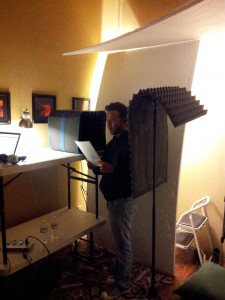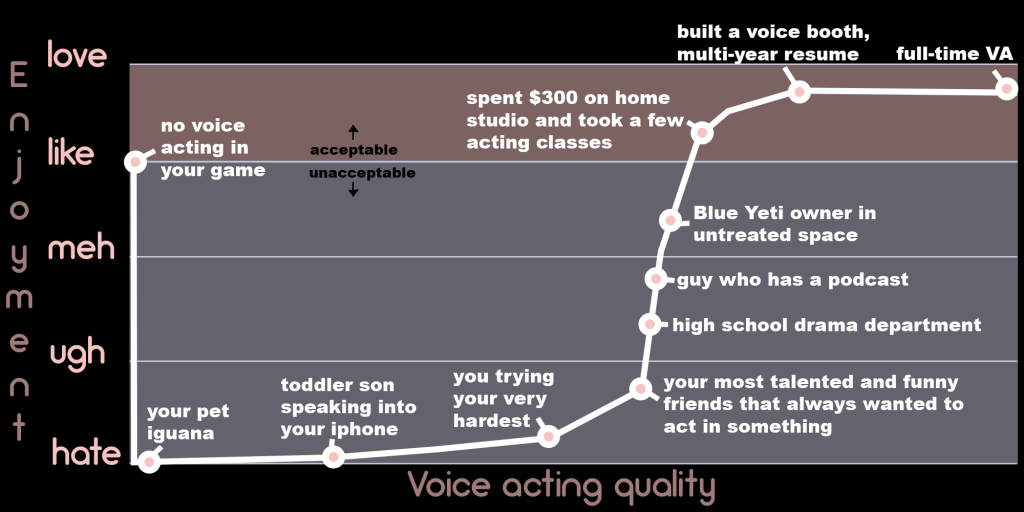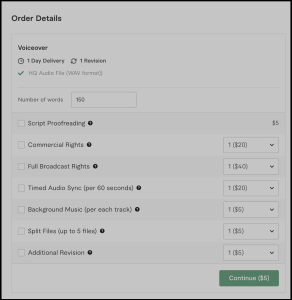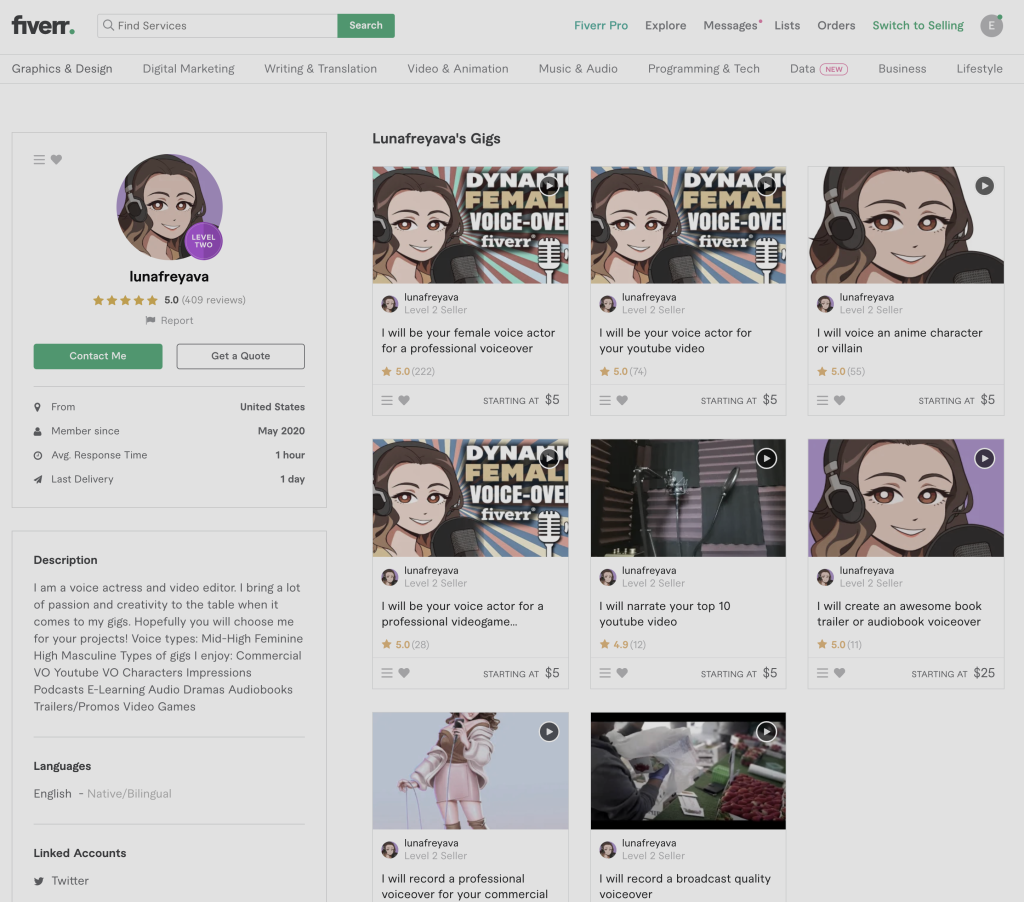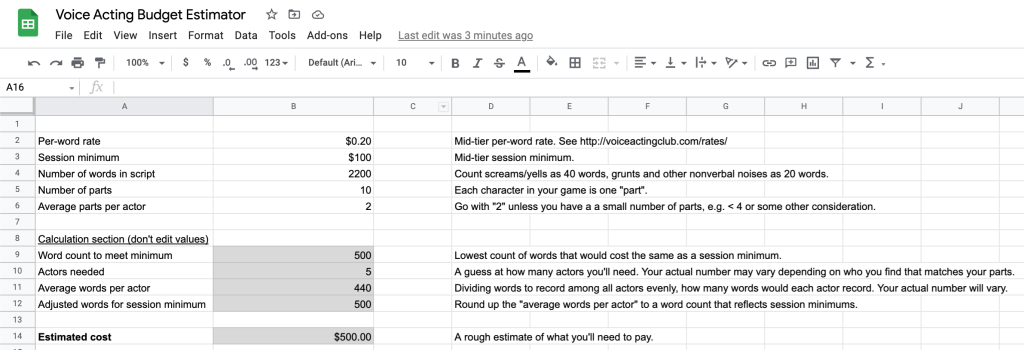This is a series of articles that describe how you, the heroic indie game developer, can get excellent voice acting into your game. This can be voice acting that sounds as good as what you hear in an AAA title, but fit within a three or four-figure indie budget.
My background: I ran a voice acting studio for video games, and I’ve spent years on various creative projects including animations, video games, audio dramas, and podcasts where voice acting was used (some demos here). I’ve just finished casting The Godkiller – Chapter 1, a puzzle adventure game that will include performances from a cast of 40 actors to produce over 2 hours of recorded dialogue and a dozen full-vocal songs.
In this first part, I want to help answer the question: Should you put voice acting in your game? This question leads pretty quickly to a discussion of the costs and effort involved, which should be weighed against the benefits.
As the series unfolds with more articles, I will give away my secrets to finding and working with voice actors to create wonderful performances that can greatly enhance your game.
Our Creative Cousin – The Voice Actor
Let me introduce you to the Voice Actor. He was probably one of those drama geeks you didn’t talk to in high school. And now he’s got a fancy microphone and likes to make funny voices into it. The two of you probably have more in common than you think.
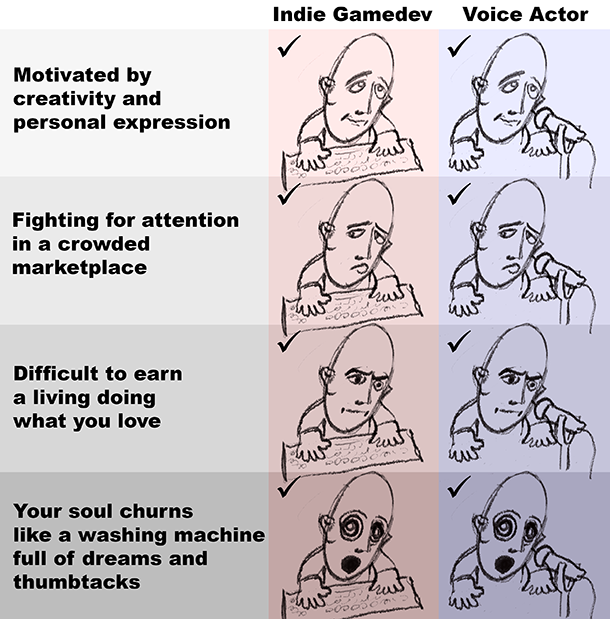
Voice actors know some version of that “indie” struggle you’re going through to get the world to pay attention to your creation. Like you, they dream of spending most of their time doing what they love, and it’s an underdog’s battle to achieve that. Consider the prospect of meeting new people in this discipline as something exciting – not just a series of transactions that will produce assets for your game. If you can do that, everything will go better – not just the end result of your completed game, but the experiences you have along the way to Release Day.
But I am getting ahead of myself. Let us first answer the question…
Should You Use Voice Acting in Your Game?
Indie devs often shy away from using voice acting in their games because they think it’s too expensive or outside their capabilities to execute well. But don’t let unfamiliarity with an option cause you to say “no” to it. Decisions like this are best made by weighing costs against benefits to judge if the action will be worth taking.
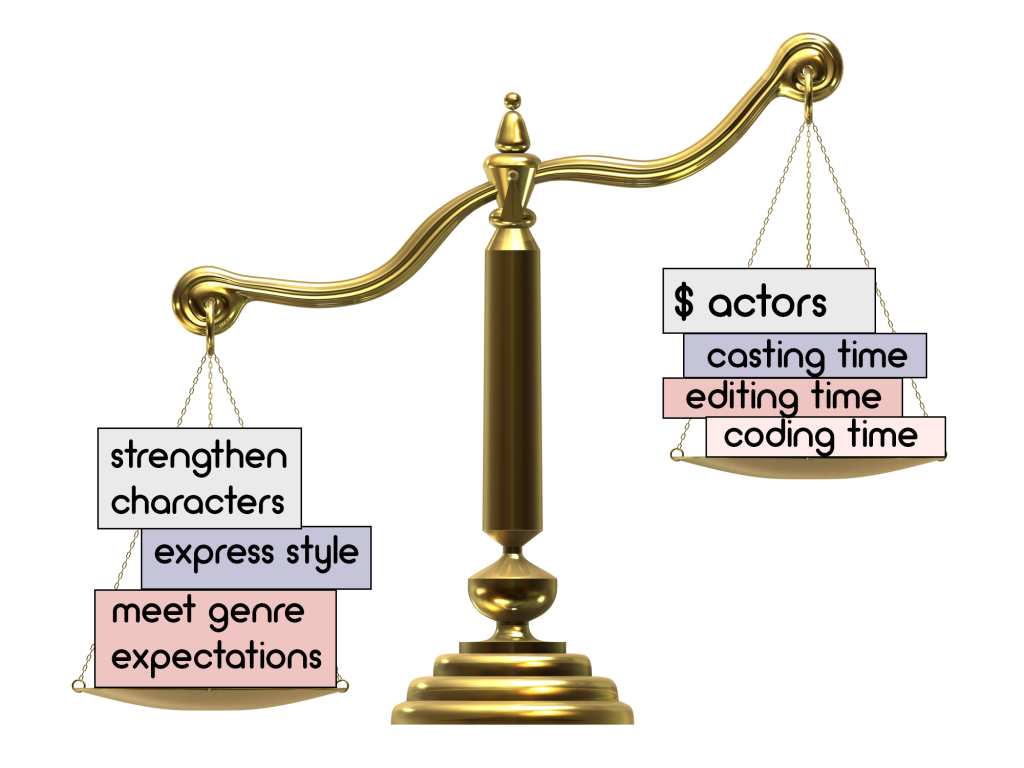
The Benefits of Using Voice Acting
The benefits will be weighted differently depending on your game, but let me describe them briefly.
- Strengthen characters – If players can hear your characters, they become more memorable. From a business perspective, if you are trying to develop a successful multi-title franchise, characters become even more important and worth investing in.
- Express style – Voice acting can bring your game’s style to the forefront. Text dialogue on a screen has a way of looking samey, despite a game’s intent to be cute, cynical, heartfelt, epic, or campy. Adding voice helps rise above that ordinary “this is a video game” feeling.
- Meet genre expectations – Some genres have players expecting or hoping for voice acting – adventure games, walking simulators, survival horror. Any game can be made without voice acting. But in some genres, you’re much better off with it.
The Costs of Using Voice Acting
Now let’s talk about the costs.
- Paying actors – Because I’m trying to get you to a certain level of quality, we must assume you will pay actors. I’ll explain more on that below.
- Casting time – You should run a proper casting call with auditions to choose the best talent from those that respond. This will take days or weeks of your time.
- Editing time – You’ll need to perform some basic editing tasks on the audio you receive from the actors and get it into usable asset form for your game. This will take days or weeks of your time.
- Coding time – You’ll need to write the code that loads and plays speech audio in your game. It’s straightforward coding, but it still takes time.
In later articles, I’ll describe the activities above better so you can understand what you’d need to do. Of course, you can also pay people to do these things if you’ve got more money than time.
How Much Do Voice Actors Cost?
From free to $3750/hour. (The latter number is my back-of-napkin calc for a Simpsons voice actor.)
I’ll narrow that down for you by using the excellent VA Indie Rate Guide from Voice Acting Club as the basis of costs. I have no affiliation with VAC, and the rate guide isn’t part of any service offering. It’s just one of those public-minded docs that’s around to help. Further, I’m going to use their “Mid-Tier” pricing since I believe that is what you’ll need to pay to attract talent that will meet expectations of video game players.
There are some different ways to calculate mid-tier pricing. For the estimation done in this article, I’ll use the per-word method because it’s fairly easy to count words, and needs less explanation than lines. Still, the Indie Rate Guide gives some good advice here on which payment method to use and why.
The diagram below is a little silly, but gives you the gist of the quality threshold you want to reach.
There is something like an “uncanny valley” to cross. At the far left, with no voice acting in your game at all, you aren’t paying any penalty. Maybe in your Zelda-like RPG you have little pop-up boxes of text that fill in with a pleasant left-to-right animation. That’s just fine. People will like your dialogue presented in this fashion.
Now suppose you want to add voice acting to your game. But you’ve got a zero dollar budget so you record with yourself, your friends, fans of the game, or anybody willing to work for free. Add this low-quality voice acting to your game, and immediately players will hate every time your characters open their mouths. You can make small improvements to voice acting quality and still have your players down in that pit of voice-hatred. To come out on the other side, you want voice actors who are at least at the semi-professional/developing-talent level. These actors need decent microphones, sound treatment in their recording spaces, and some experience, as well as talent, at acting.
For an indie game, assuming you don’t want to rely on exceptional luck, I would pay at mid-tier. That’s to make it reasonably possible for you to cross the quality threshold needed for players to like the voice acting in your game. Even then, you won’t reach that quality level without putting in work and good judgment into your casting. If you want to spend less time searching for that quality, you can pay actors more and, on average, get a more professional response. You can also turn over the casting process to an agency. In this series of articles, I will assume you’ll pay mid-tier rates and handle your own casting.
I suggest aligning your payments/policies with the VA Indie Rate Guide and communicating that to voice actors in your casting calls. I didn’t do that on my last project, but was pleasantly surprised that most of the rates and policies I invented were pretty close to the Rate Guide’s mid-tier recommendations, with the exception of minimums. My next projects will almost certainly align with the Rate Guide.
I can also hear some irritated voice actors out there complaining that the rates proposed in the guide are too low. “You get what you pay for,” etc. Please, don’t march outside my house with picket signs. I’m not saying what anybody ought to be paid. I’m commenting on the current state of the market, and how it can meet the needs of another group of people, indie game developers, that probably won’t get paid enough for their efforts either.
Let’s look at some examples of what the costs of paying actors for games could look like. I want to get past the boring and useless “it depends” answer, and serve up some concrete numbers. Then we can look at how to calculate costs for your game.
Example #1 – A Mario Kart-style game
In this game, you’ll have eight different selectable characters as the drivers. Each one will have twenty different things they say in different situations, e.g. selecting a character, taunts, winning, losing, slipping on a patch of oil. Let’s say each line is an average of ten words. That gives you 1600 words to record.
You’ll hire four different actors, two male, two female. It would be cheaper to hire just one actor, but you want some distinction in the types of voices, and it’s tough to find one person that can do all those voices.
Each of the four actors will have 400 words to record.
Cost: $400 (USD)
Example #2 – A Portal-style game
In this game, voice acting is limited to certain levels and cut scenes, and there is never any dialogue between two characters. Every piece of dialogue is either a monologue or somebody speaking to the silent player-controlled character. Your script has 600 words that will end up producing 10 minutes of spoken dialogue. For simplicity, let’s say that the evil robot character does not sing a song at the end. (I’d love to write a separate article on creating songs with vocals for video games later.)
With each actor recording just 300 words, you end up needing to pay the session minimum of $100 twice.
Cost: $200
Example #3 – A Monkey Island-style game
Let’s see what a voice-heavy point-and-click adventure game might cost.
The main character has to say witty little jokes about lots of objects in each room or location, e.g. “That’s a marvelous trash can. I’d love to throw trash in it someday.”
And that character needs to have menu-driven conversations with characters in a Ron-Gilbert-esque SCUMM interface. Let’s say there are 40 visitable locations in the game, and each one has 20 short observations that the character can make when looking at an object. And let’s say that there’s 20 characters to talk with, and each one has a dozen things to say. And throw in some lengthy dialogue around an evil pirate who must explain a very complicated plan to transform the ocean into chocolate pudding. You’ve got a very big script here – 17,800 words. That’s 178 screenplay-formatted pages, and 3 hours of recorded audio. That’s like a Martin Scorsese movie.
Because there are interactions between actors in the menu-driven dialogue, you want to allow extra time for some combination of rehearsal sessions with multiple actors or pick-ups (recording lines a second time to fix problems). I would give this complex project 20% more cost for that.
Cost: $4300
Observations and Comments on Above Costs
Did Valve spend two hundred dollars on their voice acting in Portal 2?
Obviously, not. They hired SAG-AFTRA actors (Ellen McClain, Stephen Merchant, Ashley Renfoe) and paid at least union scale rates – maybe $400/hour or $800/day. I imagine Stephen Merchant got a juicier contract from his TV celeb status. I’m giving you costs for working with voice actors that sound professional, but probably haven’t reached a level where voice acting is their day job. They’ll have voices and skills that would sound completely at-home in any AAA video game. And in fact, some of them will have AAA titles on their resumes.
Also, I’m leaving out the costs for your time. You will be handling all the casting, actor communication, and editing. This is a set of hats that may or may not fit on your head. As indies, we’re usually generalists that are slightly good at a bunch of things. You’ll want to decide if you’re a good enough voice director, contract manager, and audio engineer to pull this off.
The budget numbers above will be shockingly low to many eyes. Savings will be earned with your indie grit and gumption. E.g. You’ll do the work to find excellent talent before they are well-established actors with autograph lines at PAX.
Fiverr
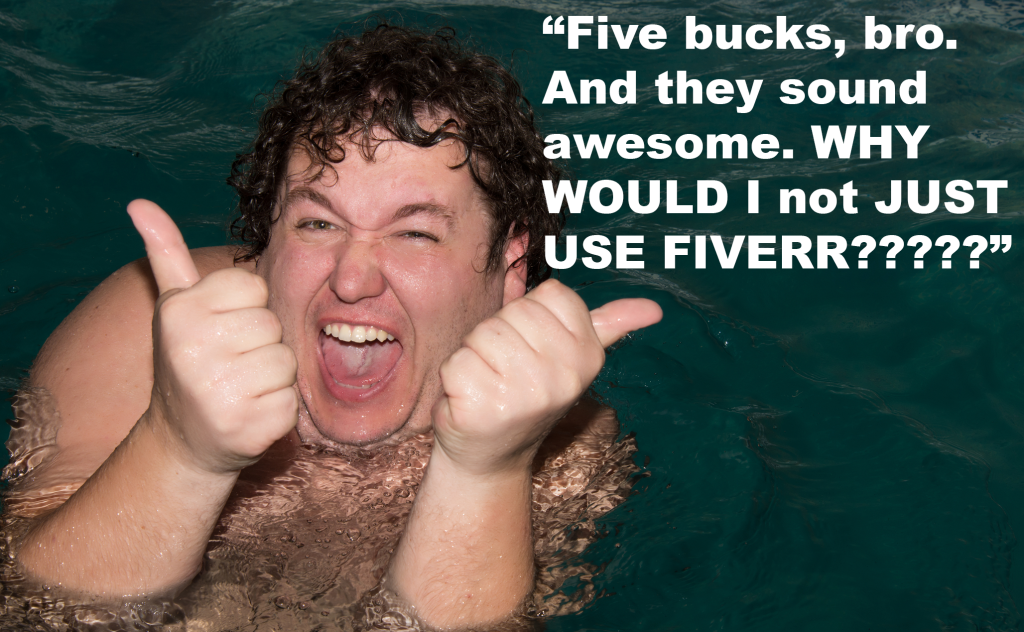
Would you stop being so damn cheap?
Sorry. I mean…
Yes, you can use Fiverr or some other site offering inexpensive commission work. I’m not going to say the quality of voice actors that offer five dollar deals is bad, because I know it’s possible to find good VAs at low prices. Plus, many of those five dollar deals have sensible extras that will cause the payment amount to go up. Check the “order detail” section and something like this is pretty typical:
You may find that the options you actually need increase the cost of your order from $5 to $50 pretty quick. The Fiverr seller isn’t being tricky with these options. They are just trying to find some way to offer their services attractively and not spend hours of their time earning a five dollar bill.
Fiverr is easy to use, inexpensive, and there are good actors there. One voice actor, LunaFreyaVA, who I found through my casting call for The Godkiller, is also on Fiverr. I love how she’s broken out some common types of requests into separate ads. E.g. there’s one for voicing Youtube top 10 videos.
I would use Fiverr if I was in a hurry, wanted a good deal, and could find an actor there with a demo/voice reel that sounded exactly like what I wanted.
But I’m really a big fan of casting calls, and I’ll explain why.
Commissions versus Casting Calls
With a casting call, you post part descriptions and ask for auditions. The auditions don’t cost you anything. You hear the exact lines you want your character to speak in the game from a number of actors. And you pick the actor that will work best for the part.
With commissioning, you listen to an actor’s voice reels (demos) to make a guess on their suitability for the part. You then enter into an engagement with the actor with the assumption that they will record your lines and you will pay them. They might offer to give you a sample or guarantee satisfaction. But for commissioned work, the actor’s expectation is going to be that as long as nothing’s wrong with their performance, you will pay for it.
So basically, with commissioning, you go to the actors. With casting calls, actors come to you.
It’s going to seem like the casting call is a lot more work. But if you were to use a commissioned service site like Fiverr to review the same number of actors as you do for an audition, the amount of work is closer. And you’ll end up with worse information available to make a choice (voice reels instead of auditions).
Do the work to run a casting call, and on average, you’ll get better casting options for your game. This is not to say that actors who work by commission are of worse quality than actors you find with casting calls. Many actors actively pursue work through both means.
You aren’t looking for the best actor. You are looking for the best actor for your specific part.
Suppose, you’re casting a male cowboy and ten people audition. Maybe four actors don’t sound acceptable to you, five sound like decent, usable choices, and the tenth actor… wow. He’s got a great rasp in his throat. His acting ranges smoothly from vulnerable to menacing. You hear that voice leaving the lips of your character and turning your players into fans.

That’s why you go through the trouble of casting calls and auditions. You’re hunting for magic.
Estimating Cost for Your own Game
I just gave three quick examples above, and didn’t really show all my work. But it’s pretty simple. I made a spreadsheet for you that will do all the calculations. Click that link and save a copy so that you can make edits to the values.
To estimate voice acting cost for your game, you need:
- Number of words in your script. If you don’t have the script written yet, just make a quick guess. A sentence written in the concise style often used for video game dialogue is 10 words.
- Number of parts (characters) to cast.
If you want to go beyond that quick estimate and arrive at something more accurate, then you’ll want to break the estimate out by each part and its individual word count, and think a little harder about what actors you’ll need and how to use session minimums efficiently.
Estimating Your Time
I don’t want to explain the specific things you’ll need to do for working with the actors yet. But I do want you to leave you with the ability to estimate how much time you’ll need to spend.
You can use the formula I have in the spreadsheet. (Click the link and save a copy.)
Omitted from this estimate is the amount of time you’ll need to spend coding for speech audio within your game. You’re in a much better position to estimate that for your game than I am. You might be using Unity, Godot, or a handmade engine. You might have per-level scripting to do to trigger playback of audio. You’re a developer and it’s your game, so I’ll let you figure out the estimate for how much coding is ahead of you for voice.
The multipliers I put into the formula above are based on my actual time spent in June ’21 casting 40 actors to record about 13,000 words. And I’ve adjusted upwards for someone that is new to doing the work, but smart and capable – you! So for example, I can probably audio-edit something like 1000 words per hour, but I’m betting you can edit around 200.
Conclusion
I’m hoping this article was a decent introduction to the often-underused capability of voice acting in games. I’d love see more indies working with voice actors. We can be magnificent allies to each other.
In part 2, I’ll explain how to create a casting call and get a great response by running it entirely from Discord.

